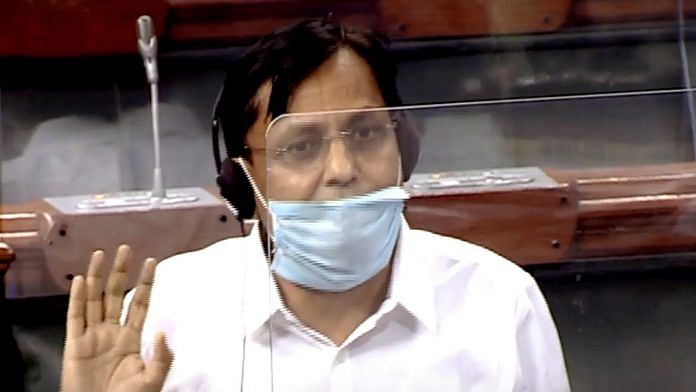New Delhi: Former Prime Minister Indira Gandhi introduced the draconian Foreign Contribution (Regulation) Act (FCRA) in 1976, the UPA government made it much tougher in 2010 and now, the Narendra Modi government seeks to tighten whatever few loopholes or breathing spaces were left in the law, ThePrint’s Editor-in-Chief Shekhar Gupta said in episode 572 of ‘Cut The Clutter’.
The FCRA was passed by Indira Gandhi at the peak of Emergency. Her purpose was first to make sure that rival political parties could not receive money from overseas. It was draconian, xenophobic and rested on the theory of the ‘foreign hand’.
Gandhi was paranoid that people like politician George Fernandes were well linked to international socialists, including Willy Brandt, German leaders and European socialists.
“But wherever the government wanted to look the other way, it did look the other way,” added Gupta. For example, pro-CPI individuals continued getting their money from North Korea or Soviet Union and those weren’t classified as donations but rather ‘supplements’.
The original law also sought to block foreign contributions to editors, correspondents, columnists, printers, publishers and most importantly, cartoonists. “I think she [Indira Gandhi] was so hurt by what Abu Abraham and RK Laxman were doing to her, that she specifically included cartoonists,” added Gupta.
In 2010, the UPA government tightened the FCRA, and now the Congress is criticising the Modi government for seeking to further tighten the same law. “In our country, if a bad law is passed, nobody changes it. In fact, nobody changes it for the better. Every subsequent guy usually changes it for the worse,” Gupta said.
Also read: Modi govt tables FCRA amendments, opposition & NGOs call it fatal blow to civil society work
Modi government’s amendments
First, the Modi government seeks to tighten the FCRA’s definition of “public servant” under the Indian Penal Code (IPC). Now, any politician, media personnel, legislator from receiving any foreign funding by way of donations.
The proposed amendments does not allow one to receive foreign contributions unless they seek clearance from the Government of India or apply for an FCRA licence. The original law had allowed FCRA licences to be permanent but the UPA government restricted it to five years. “That is why in 2015, more than 10,000 NGOs suddenly lost their FCRA licence and had to apply again,” said Gupta.
Second, the original law allowed foreign contributions to be spent as desired but the 2010 amendment said only 50 per cent of the amount could be spent on administrative expenses. The BJP government now wants to reduce that to 20 per cent. It will also now demand the Aadhaar numbers of all directors, CEOs and key employees of NGOs, which receive money from overseas for their FCRA licences.
Third, the UPA government’s version of the bill said if the Government of India has doubts about an NGO, it can suspend its functioning for 180 days. The Modi government wishes to extend that period by another 180 days i.e. an entire year — something that Congress has now objected to.
Next, the proposed amendments seek to stop NGOs with FCRA licences from transferring extra money in their account to other NGOs with licences. Also, any interest accrued on top of contributions will be subject to FCRA rules and restrictions.
The BJP’s basic argument is that FCRA contributions have doubled in the last 10 years, and that the data suggests a lot of people are misusing it, explained Gupta.
Also read: Govt cancelled FCRA registration of 1,807 NGOs in 2019 for violating laws
What the BJP isn’t changing in FCRA
In 2010, the UPA expanded the FCRA’s definition of political parties to include all organisations of political nature like trade unions, farmers’ organisations, workers, youth forums etc. The Modi government doesn’t seek to change this.
What’s also interesting to note is that in 2014, the Delhi High Court found political parties, including the BJP and the Congress, guilty of receiving foreign contributions. Therefore, the BJP amended the FCRA by burying a tiny amendment in its 2016 Finance Bill that made it easier for parties to accept foreign funds.
In 2018, the government amended it further to do away with the scope for scrutiny of political parties’ funding since 1976, which equally provided relief to both the BJP and the Congress.
Thus, in this way, everyone is complicit in this case of political parties receiving funds from abroad, according to Gupta.
“So, any law is only as good as the powers implementing it and their intentions,” concluded Gupta.
Watch the latest episode of CTC here:




Indra brought in soft FCRA but Modi made it draconian…
The earlier FCRA of Indra Gandhi, albeit unnecessary, is not at all draconian. But Modi govt is deliberately making it tougher. Only non-profits will be highly affected. Vasudhaiva kutumbakam has gone for a six. You are trying to justify their injustice and that is your cunning weakness.
Why do Indian NGOs whose activities in India are not supported by local donations operating? If no one in country wants to support your so called charitable activities why would you want to carry them out? Because someone who doesn’t have a stake in system wants to? When there is a democratically elected government, why should non democratically elected get access to funds to spend ? Who are these NGOs? Why is someone giving them money when even their own countrymen aren’t. What is the are they wish to grind? A civil society run by foreign charity is not civil, its sold out. There are no free lunches, so why is someone giving them.money?
Now that only political parties can receive unrestricted foreign funds, Election Commission should review the criteria for recognition of political parties and weed out bogus registrations of political parties. During demonitization exercise, many such unheard of political parties came up to the surface and received huge cash funding!! No one knows what happened to those funds!
Modi needs to complete the task on hand fully,